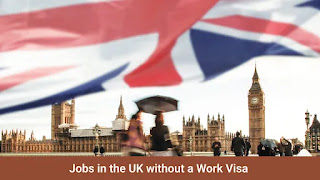Work in the UK without a work permit
The United Kingdom, with its bustling cities, rich history, and diverse cultural tapestry, beckons individuals from all corners of the globe. While securing a work permit remains the primary pathway for non-UK residents seeking employment opportunities, certain exceptional situations allow individuals to work legally without one. However, it's imperative to understand the intricacies involved, as working unauthorized in the UK can have serious repercussions, including hefty fines, deportation, and potential entry bans.
Therefore, before embarking on any potential career path in the UK, thorough research and due diligence are crucial. This guide aims to provide a comprehensive overview of the limited scenarios where a work permit might not be mandatory, emphasizing that consulting the official UK government resources and potentially seeking professional legal counsel specializing in UK immigration law are essential to ensure complete compliance with all relevant regulations.
1. The Privilege of Dual Citizenship:
For individuals fortunate enough to hold dual citizenship, one of which being UK citizenship, the path to employment is considerably simplified. In this scenario, the very act of holding UK citizenship automatically grants you the unconditional right to work in the country, eliminating the need for a work permit or any additional visa. This privilege stems from your established legal status as a UK citizen, granting you the same employment rights and freedoms as any native-born citizen.
2. Spouses/Civil Partners of UK Citizens: Navigating Family Visa Options:
If you are the spouse or civil partner of a UK citizen (or someone with settled or pre-settled status), you might be eligible to work in the UK under specific categories. This pathway involves obtaining a family visa, which allows you to reside and work in the UK based on your relationship with the UK citizen or resident. However, navigating the intricacies of family visas requires careful consideration. Different types of family visas exist, each with specific eligibility criteria and application processes. Consulting the UK Visas and Immigration website (https://www.gov.uk/browse/visas-immigration) or seeking legal counsel from immigration specialists can provide valuable guidance in exploring the most suitable route based on your specific circumstances.
3. Participating in Exchange Programs: A Limited Window of Opportunity:
Certain exchange programs offer unique opportunities for young individuals to gain international work experience and cultural immersion. The International Youth Mobility Scheme (YMS), for instance, allows young citizens of specific countries to work and travel in the UK for a limited period, typically one or two years. These programs are designed to foster cultural exchange and provide valuable opportunities for professional development. However, individual eligibility and program specifics can vary based on your nationality and the program itself. Meticulous research and seeking information directly from the program organizers are essential prior to applying.
4. Diplomats and Military Personnel: A Matter of Bilateral Agreements:
Diplomats and military personnel stationed in the UK** typically don't require work permits** due to the existence of bilateral agreements between their home countries and the UK. These agreements establish diplomatic relations and often include provisions regarding the work and residency rights of diplomatic and military personnel stationed in each other's territories. However, it's important to understand that the specific details and regulations governing these arrangements can vary depending on the specific agreement between the countries involved. For any questions or concerns, individuals are advised to consult their respective embassies or consult with legal professionals specializing in international law.
Beyond the Exceptions: Crucial Considerations and Resources:
Remember, the scenarios mentioned above represent exceptions to the general rule that requires a work permit for non-UK residents seeking employment in the UK. Each exception comes with its own set of specific requirements, limitations, and application processes.
Therefore, thorough research and seeking guidance from official UK government resources are imperative. The UK Visas and Immigration website https://www.gov.uk/browse/visas-immigration) serves as a valuable starting point for exploring different visa and immigration options. Additionally, consulting with a registered immigration lawyer or migration agent can provide invaluable support in navigating the complexities of UK immigration law and ensuring compliance with all regulations.
This guide aims to provide a general overview of the limited situations where a work permit might not be required for working in the UK. It is not intended to substitute for professional legal advice. Always remember, that seeking expert guidance from qualified legal professionals specializing in UK immigration law is crucial to ensure a smooth and successful journey towards your career aspirations in the United Kingdom.
Sponsored Links






